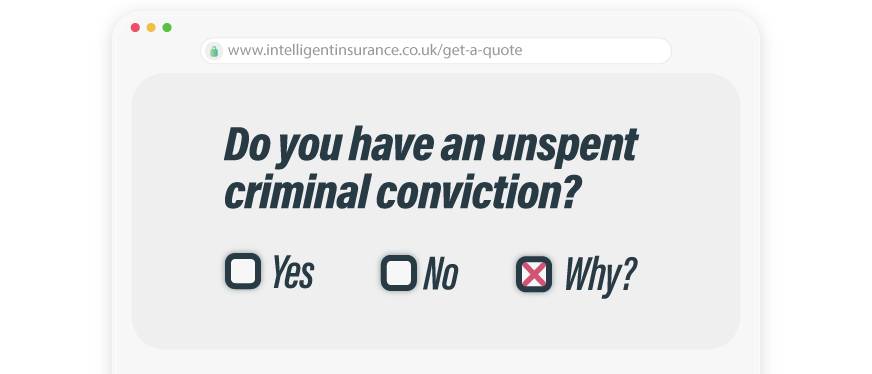No-Judgement Approach: At Intelligent Insurance, we believe in treating each customer with respect and understanding. We gather the details of your conviction simply to ensure we arrange the right level of cover. You won’t be judged for your past; we just need to make sure your policy accurately reflects your circumstances.
The Role of Risk Assessment
“Our customers often worry that declaring past convictions will automatically exclude them from coverage, but in reality we can offer cover for most scenarios and it’s about ensuring transparency for both insurer and policyholder,” notes our Product Manager, Scott Raisbeck. “Open disclosure of unspent convictions allows us to provide a policy that genuinely suits your circumstances, without risking complications later on. By being upfront, you ensure your policy stands firm when you need it most.”
Spent vs Unspent Convictions
- Unspent Convictions: Must be disclosed if your insurer’s questions require it.
- Spent Convictions: Legally, you don’t need to reveal these for home insurance purposes.
If you’re unsure of your conviction’s status, check the Unlock Disclosure Calculator or relevant resources on GOV.UK to confirm whether it’s spent or unspent.
Pending Prosecutions: At Intelligent Insurance, we do ask customers to disclose if they’re facing a pending prosecution. However, we believe in “innocent until proven guilty,” so we won’t apply extra rating or restrictions until the outcome of the case is known. If a prosecution leads to a new conviction, simply let us know so that we can reassess your policy accurately.
Do Insurers Actually Check Your Record?
- Policy Cancellation: If you fail to declare an unspent conviction when asked, your insurer can invalidate your policy from the start.
- Claim Rejection: Any claim you make could be refused if they discover undisclosed criminal history, leaving you financially exposed.
- Further Difficulty Insuring: Future insurers may ask if you’ve ever had a policy cancelled or voided, creating a long-term obstacle to getting affordable cover.
Being honest from the outset is the safest route. Insurers that accept higher-risk applicants are typically prepared to offer cover; you just need to ensure they have the correct information.
Why Some Convictions Affect Premiums
Tip: If you’re worried about premium increases, consider improving home security (e.g., installing alarms or upgraded door locks). While it won’t erase the conviction, showing you’re taking precautions can sometimes demonstrate a lower risk profile.
Staying Compliant and Covered
- Answer Questions Honestly: Never assume a conviction is too minor or too old to matter. If it’s unspent (or if you have a pending prosecution), it must be disclosed if asked.
- Review Policy Terms: Some policies only ask about convictions at inception or renewal. If you acquire a new conviction mid-term, check whether you need to inform your insurer right away.
- Confirm Spent Status: If your conviction’s rehabilitation period has ended, it becomes spent. You no longer need to disclose it, but be absolutely sure of the date and details.
Final Thoughts
If you’re seeking home insurance with an unspent criminal conviction, turning to a specialist provider can help you find competitive cover without the stress of multiple refusals. By understanding why insurers ask these questions and how to respond correctly, you can navigate the process more confidently and secure the right protection for your home.

